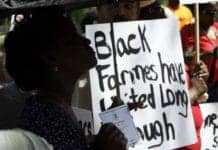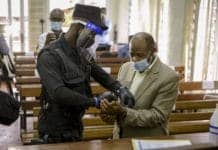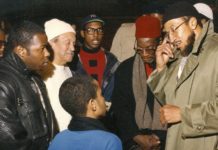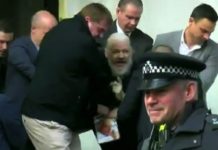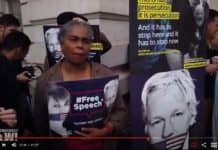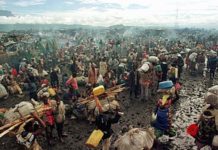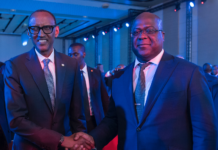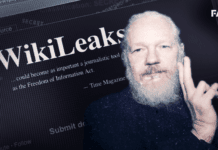
by Ann Garrison
Julian Assange has been moved to Belmarsh Prison hospital and the UN Rapporteur on Torture has warned that he could die there.
Last week, someone who claimed to be a prisoner sent a cell phone video of Assange to Gateway Pundit reporter Cassandra Fairbanks via Twitter. Gateway Pundit, RT and Ruptly published it online, but none of the corporate media did. Fairbanks said she had decided to publish it and summarize what she knew about it after seeing that the account tweeting it at press had tweeted it at CNN. She said she imagined that CNN and other mainstream outlets would publish it with all the usual smears and disinformation, but that they wouldn’t want to source Gateway Pundit or the Russian government outlets RT and Ruptly. She also reported that her source said Assange had become a celebrity prisoner and that other prisoners wanted to meet and talk to him as soon as he arrived.
The cell phone video was reportedly shot in May, before Assange was moved to the Belmarsh Prison hospital. Cassandra Fairbanks was able to speak to the person claiming to be a prisoner and concluded that whoever he was, he was trying to help Assange. Others, however, suspected that the video might have been released by someone else, and might be a psyop of some sort. Hungarian scholar George Szamuely, speaking on the weekly Unity4J online vigil, expressed skepticism because shooting the video with a contraband cell phone would have put the prisoner at great risk:
“When you release this, how are the prisons going to respond? I mean that’s it. The prison authorities are going to come down on you like a ton of bricks. They’re going to take the whole place apart – every single bed, mattress, bookshelf or whatever to find this contraband. So by disclosing this footage, you’re pretty much precluding the possibility of any further video because they’re going to come and take your phone away but quick and punish you quite severely for having a contraband phone.”
Contraband cell phone possession has indeed become a major infraction in prisons, tantamount or second only to drug dealing or stabbing another prisoner. In 2018, former Black Panther Romaine “Chip” Fitzgerald was denied parole after 49 years because of a cell phone infraction. Hopefully, Assange will not be accused of collaborating to produce the video. He has been sentenced to 50 weeks in prison and will be eligible for parole after serving half that time, unlikely as that possibility seems.
Whatever the video’s provenance, one thing was obvious – that Assange had drastically lost weight, as Cassandra Fairbanks said on the Unity4J vigil.
“I want to note that these pictures were especially shocking to me because I just saw Julian in March, and it looks like he has lost another 30 pounds. I think that people who have seen him recently – beyond the pictures of him being dragged out of the embassy – can all attest that these pictures are shocking.

“People saying that he looks good are really frustrating because yes, he looks good in a general sense and he smiled several times. But when you think about the fact that he looked completely different in March, it’s shocking, and even in March I was worried about how much weight he’d lost. I had visited him in January as well, and in those months between January and March, he had lost a lot of weight too. Now, in these photos, he looks like a completely different person – like he’s been cut in half.”
British security forces arrested Assange in early April and dragged him out of Ecuador’s London Embassy to Belmarsh Prison, on the outskirts of London. In May, UN Rapporteur on torture Nils Melzer visited him there with a doctor and a psychiatrist, and reported that he suffered from “physical ailments” and showed undeniable signs of prolonged psychological torture including emaciation, jitters and inability to carry on “a structured conversation.”
He also warned that Assange could very well die in prison and said that he should not be extradited to the U.S., where he could not get a fair trial and where his fragile condition would further deteriorate. “This is persecution, not prosecution,” he said, by the U.S., U.K., Swedish and Ecuadorean states. In conversation with Chris Hedges, he said that he did not believe Assange had committed any crimes warranting further prison time.
After the release of the video, the Rapporteur said that it had been shot before his visit, before the reopening of the Swedish sex crimes investigations, and before Assange was indicted for another 17 counts of espionage in the Eastern District Court of Virginia.
UN Rapporteur on torture Nils Melzer visited Assange and warned that he could very well die in prison and said that he should not be extradited to the U.S., where he could not get a fair trial and where his fragile condition would further deteriorate. “This is persecution, not prosecution,” he said.
At the end of May, Assange was moved to the prison hospital. At the time, prison authorities said they had “grave concerns for his health” without saying why. However, on June 9, the British tabloid The Sun quoted an anonymous prison source saying:
“Assange is unwell generally but has recently been struggling to eat, which has made it worse. He looked near to collapse, gaunt and frail so they have got him in as a precaution.
“He will be looked after in the healthcare wing and given supplements and plenty of liquid if he is struggling with food.
“Some staff feared he was on hunger strike although that is not the case.
“Some of his health problems seem to stem from being cooped up in the embassy for so long.
“And his state of mind is not great, either.”
The Sun is certainly not the most reliable publication, but the quotations seem more than plausible given everything else reported about Assange’s health.
Assange was too ill to attend his first U.S. extradition hearing, but WikiLeaks reported that the magistrate had scheduled the next for June 14 in the Belmarsh Magistrate’s Court.
Anyone who wants to write to Assange can find the address and precise instructions at Write to Julian.
Ann Garrison is an independent journalist based in the San Francisco Bay Area. In 2014, she received the Victoire Ingabire Umuhoza Democracy and Peace Prize for her reporting on conflict in the African Great Lakes region. She can be reached at ann@kpfa.org.
Editor’s note: The Ruptly video can’t be embedded but can be watched at https://youtu.be/ylCDaBM3gHo.

 Store
Store



